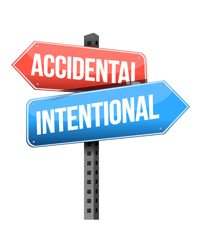Does Willful Conduct Automatically Lead to Higher Recoveries?
March 9, 2015
 Personal injuries usually arise from accidents. Whether the circumstances include a motor vehicle, slip, trip and fall or a variety of other situations, it is a rare occasion that the conduct that caused the injury is intentional. But sometimes this is the case and the law makes special provisions for these situations.
Personal injuries usually arise from accidents. Whether the circumstances include a motor vehicle, slip, trip and fall or a variety of other situations, it is a rare occasion that the conduct that caused the injury is intentional. But sometimes this is the case and the law makes special provisions for these situations.
Personal injury actions can be based on a number of theories including negligence, recklessness or willful conduct. Each theory requires the plaintiff to prove something different. A finding of negligence requires that the plaintiff prove that the defendant failed to act as a reasonably prudent person would under similar circumstances. Recklessness requires that it be proven that the defendant knew or should have know of the risk of harm but proceeded with the course of conduct anyway. To find that the defendant acted willfully, there must be enough evidence to show that the defendant intended to cause harm. While there is a fine line between negligence and recklessness, causing the two to usually be alleged in conjunction with one another, willful conduct is a different allegation completely. A good example of willful conduct is in the case of battery, where one person makes contact with another person without consent and with the intent of causing them physical harm.
While it is not automatic or guaranteed that someone will recover more if they can prove willful, as opposed to negligent or reckless conduct, it is a distinct possibility. First, the ordinary damages awarded in these cases might be increased due to the finding that the defendant acted intentionally. Second, punitive damages may be awarded. Punitive damages are those awarded with the purpose of punishing the defendant for their conduct as opposed to compensating the plaintiff for their loss. Punitive damages are often times awarded with the purpose of making an example out of the defendant to deter others from future conduct. These damages are rare but are awarded in certain situations, especially when the conduct that caused the harm was found to be intentional. The conduct usually has to be outrageously bad for a judge to award this type of compensation. Punitive damages are governed by state law and therefore awards of this nature vary across the county.
If you suffered personal injuries as a result of another individual or entities willful conduct, you may be entitled to a significant amount of compensation. Contact our experienced personal injury attorneys for a consultation today.